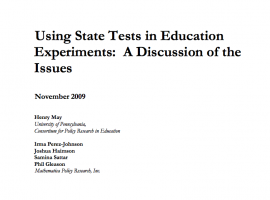Securing data on students’ academic achievement is typically one of the most important and costly aspects of conducting education experiments. As state assessment programs have become practically universal and more uniform in terms of grades and subjects tested, the relative appeal of using state tests as a source of study outcome measures has grown. However, the variation in state assessments—in both content and proficiency standards— complicates decisions about whether a particular state test is suitable for research purposes and poses difficulties when planning to combine results across multiple states or grades. This discussion paper aims to help researchers evaluate and make decisions about whether and how to use state test data in education experiments. It outlines the issues that researchers should consider, including how to evaluate the validity and reliability of state tests relative to study purposes; factors influencing the feasibility of collecting state test data; how to analyze state test scores; and whether to combine results based on different tests. It also highlights best practices to help inform ongoing and future experimental studies. Many of the issues discussed are also relevant for nonexperimental studies.
Download PDF: https://ies.ed.gov/ncee/pdf/2009013.pdf
Citation: May, H., Perez-Johnson, I., Haimson, J., Sattar, S., & Gleason, P. (2009). Using state tests in education experiments: A discussion of the issues (NCEE 2009-013). Washington, DC: National Center for Education Evaluation and Regional Assistance, Institute of Education Sciences, U.S. Department of Education.

Published by